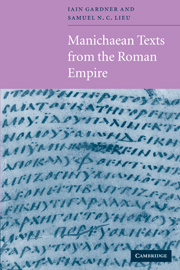Book contents
- Frontmatter
- Contents
- List of plates
- List of maps
- List of contributors
- Preface
- Acknowledgements
- Notes for the reader
- List of abbreviations
- Map 1 The Sassanian Empire
- Map 2 The Roman Empire
- 1 Introduction
- 2 The life of Mani
- 3 Manichaeism in the Roman Empire
- 4 The scriptures of Mani
- 5 Teachings
- 6 Worship and ethic
- 7 Community texts
- List and concordance of texts
- Glossary
- Bibliography
- Index
3 - Manichaeism in the Roman Empire
Published online by Cambridge University Press: 10 December 2009
- Frontmatter
- Contents
- List of plates
- List of maps
- List of contributors
- Preface
- Acknowledgements
- Notes for the reader
- List of abbreviations
- Map 1 The Sassanian Empire
- Map 2 The Roman Empire
- 1 Introduction
- 2 The life of Mani
- 3 Manichaeism in the Roman Empire
- 4 The scriptures of Mani
- 5 Teachings
- 6 Worship and ethic
- 7 Community texts
- List and concordance of texts
- Glossary
- Bibliography
- Index
Summary
The religion of Mani was founded on clear universalist principles. His travels to Upper Mesopotamia, Iran and India would have brought him in contact with Christianity, Zoroastrianism and Buddhism; and what struck him most about these established earlier religions was their apparent cultural and geographical boundaries. In a Middle Persian fragment which is probably derived from the semi-canonical Šābuhragān (a summary of his religion which he had translated into Middle Persian for the reigning Shahanshah Shapur I), Mani tells one of his disciples that the most important proof of the truth of his new revelation is its success as a universalist religion which would transcend geographical and national barriers:
{Header:} The ascension …
{R} … till the end (in the w)orld is established?' And (the lord (?) replied) to him: ‘This religion which was chosen by me is in ten things above and better than the other religions of the ancients. Firstly: The older religions were in one country and one language; but my religion is of the kind that it will be manifest in every country and in all languages, and it will be taught in far away countries.
Secondly: The older religions (remained in order) as long as there were holy leaders in it; but when the leaders had been led upwards, then their religions became confused and they became slack in commandments and pious works, and by {V} greed and fire (of lust) and desire were deceived. However, my religion will remain firm through the living (… tea)chers, the bishops, the elect and the hearers; and of wisdom and works will stay on until the end. […]
- Type
- Chapter
- Information
- Manichaean Texts from the Roman Empire , pp. 109 - 150Publisher: Cambridge University PressPrint publication year: 2004



